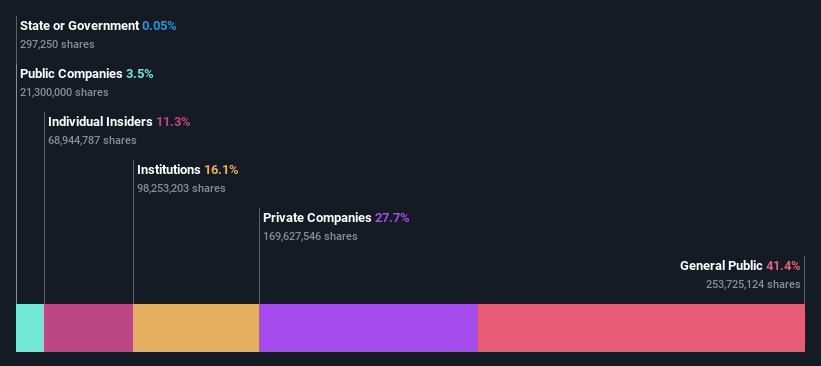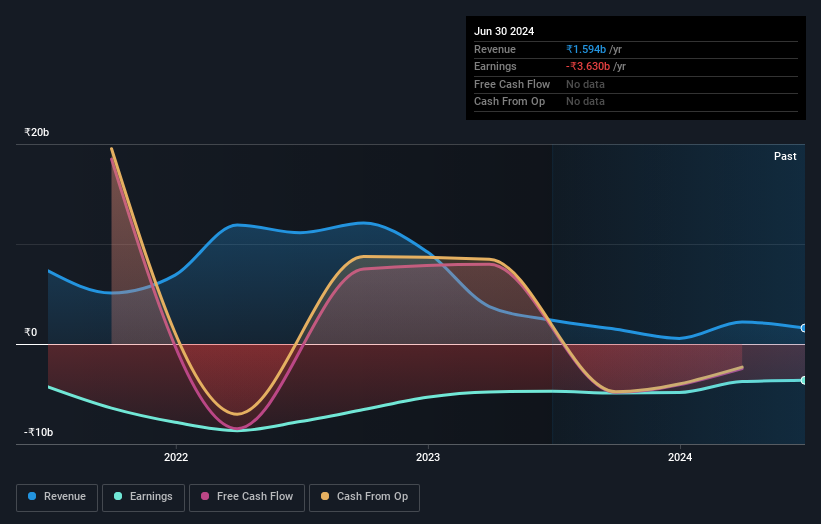- India
- /
- Capital Markets
- /
- NSEI:DHANI
Retail investors in Dhani Services Limited (NSE:DHANI) are its biggest bettors, and their bets paid off as stock gained 20% last week
Key Insights
- Significant control over Dhani Services by retail investors implies that the general public has more power to influence management and governance-related decisions
- The top 10 shareholders own 50% of the company
- Insiders own 11% of Dhani Services
To get a sense of who is truly in control of Dhani Services Limited (NSE:DHANI), it is important to understand the ownership structure of the business. The group holding the most number of shares in the company, around 41% to be precise, is retail investors. That is, the group stands to benefit the most if the stock rises (or lose the most if there is a downturn).
As a result, retail investors were the biggest beneficiaries of last week’s 20% gain.
Let's take a closer look to see what the different types of shareholders can tell us about Dhani Services.
Check out our latest analysis for Dhani Services

What Does The Institutional Ownership Tell Us About Dhani Services?
Institutional investors commonly compare their own returns to the returns of a commonly followed index. So they generally do consider buying larger companies that are included in the relevant benchmark index.
We can see that Dhani Services does have institutional investors; and they hold a good portion of the company's stock. This implies the analysts working for those institutions have looked at the stock and they like it. But just like anyone else, they could be wrong. It is not uncommon to see a big share price drop if two large institutional investors try to sell out of a stock at the same time. So it is worth checking the past earnings trajectory of Dhani Services, (below). Of course, keep in mind that there are other factors to consider, too.

Dhani Services is not owned by hedge funds. Looking at our data, we can see that the largest shareholder is Inuus Developers Private Limited with 24% of shares outstanding. Meanwhile, the second and third largest shareholders, hold 5.6% and 4.2%, of the shares outstanding, respectively. In addition, we found that Divyesh Kumar Shah, the CEO has 1.8% of the shares allocated to their name.
We did some more digging and found that 10 of the top shareholders account for roughly 50% of the register, implying that along with larger shareholders, there are a few smaller shareholders, thereby balancing out each others interests somewhat.
While studying institutional ownership for a company can add value to your research, it is also a good practice to research analyst recommendations to get a deeper understand of a stock's expected performance. As far as we can tell there isn't analyst coverage of the company, so it is probably flying under the radar.
Insider Ownership Of Dhani Services
The definition of an insider can differ slightly between different countries, but members of the board of directors always count. Company management run the business, but the CEO will answer to the board, even if he or she is a member of it.
Insider ownership is positive when it signals leadership are thinking like the true owners of the company. However, high insider ownership can also give immense power to a small group within the company. This can be negative in some circumstances.
It seems insiders own a significant proportion of Dhani Services Limited. It has a market capitalization of just ₹39b, and insiders have ₹4.4b worth of shares in their own names. It is great to see insiders so invested in the business. It might be worth checking if those insiders have been buying recently.
General Public Ownership
With a 41% ownership, the general public, mostly comprising of individual investors, have some degree of sway over Dhani Services. While this size of ownership may not be enough to sway a policy decision in their favour, they can still make a collective impact on company policies.
Private Company Ownership
It seems that Private Companies own 28%, of the Dhani Services stock. It might be worth looking deeper into this. If related parties, such as insiders, have an interest in one of these private companies, that should be disclosed in the annual report. Private companies may also have a strategic interest in the company.
Public Company Ownership
Public companies currently own 3.5% of Dhani Services stock. It's hard to say for sure but this suggests they have entwined business interests. This might be a strategic stake, so it's worth watching this space for changes in ownership.
Next Steps:
I find it very interesting to look at who exactly owns a company. But to truly gain insight, we need to consider other information, too. Consider risks, for instance. Every company has them, and we've spotted 2 warning signs for Dhani Services you should know about.
If you would prefer check out another company -- one with potentially superior financials -- then do not miss this free list of interesting companies, backed by strong financial data.
NB: Figures in this article are calculated using data from the last twelve months, which refer to the 12-month period ending on the last date of the month the financial statement is dated. This may not be consistent with full year annual report figures.
New: Manage All Your Stock Portfolios in One Place
We've created the ultimate portfolio companion for stock investors, and it's free.
• Connect an unlimited number of Portfolios and see your total in one currency
• Be alerted to new Warning Signs or Risks via email or mobile
• Track the Fair Value of your stocks
Have feedback on this article? Concerned about the content? Get in touch with us directly. Alternatively, email editorial-team (at) simplywallst.com.
This article by Simply Wall St is general in nature. We provide commentary based on historical data and analyst forecasts only using an unbiased methodology and our articles are not intended to be financial advice. It does not constitute a recommendation to buy or sell any stock, and does not take account of your objectives, or your financial situation. We aim to bring you long-term focused analysis driven by fundamental data. Note that our analysis may not factor in the latest price-sensitive company announcements or qualitative material. Simply Wall St has no position in any stocks mentioned.
About NSEI:DHANI
Dhani Services
Engages in the real estate development, broking, financing and digital wallet services, asset reconstruction, e-commerce, and related businesses through its Dhani app in India.
Adequate balance sheet with acceptable track record.
Similar Companies
Market Insights
Community Narratives





